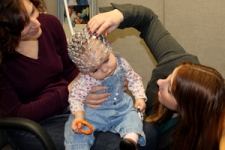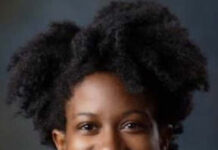 Lisa S. Scott, an assistant professor of psychology at the University of Massachusetts at Amherst, finds that children begin to distinguish people by racial characteristics by the age of nine months.
Lisa S. Scott, an assistant professor of psychology at the University of Massachusetts at Amherst, finds that children begin to distinguish people by racial characteristics by the age of nine months.
According to Scott’s research, at the age of nine months infants are better at recognizing facial and emotional expressions of people within groups they interact with the most. According to Dr. Scott’s findings, nine-month-old infants show a decline in their ability to tell apart two faces of people of a different race.
Dr. Scott brought 48 White babies with little or no exposure to African American to her lab. She showed them pictures and measured their brain activity. Five-month-old babies were found to have no differences in facial recognition tests but nine-month-old babies were better at telling apart two faces within their own race.
This research suggests that throughout the first year of life, babies are developing highly specialized perceptual abilities in response to important people in their environment, such as family members. This focus of attention to familiar groups of people compared to unfamiliar groups is hypothesized to be the root of later difficulties some adults have in identifying and recognizing faces of other races.
Dr. Scott says, “The results of this research may serve as a guide for early education and interventions designed to reduce later racial prejudice and stereotyping. These results suggest that biases in face recognition and perception begin in preverbal infants, well before concepts about race are formed. It is important for us to understand the nature of these biases in order to reduce or eliminate them.”
Dr. Scott’s research is published in the May issue of the journal Developmental Science.










I am not surprised at the results of the study focusing on the degree to which children of a specific age can or cannot recognize different faces and emotional reactions of people from a group different than their own group or the group they most interactive. I am surprised however that they did not also include children of other races also. I believe there would be a different results across different groups. (Possibly) The fact that the children were less able to discern the facial emotions displayed by the faces of the different group fits the same pattern of the same groups’ adults. It is well know among individuals who teach multicultural or intercultural training workshops, that each group shows, reads and reacts to various scenerios differently, from a cultural perspective, taught within their group vicariously. When the differing group tries to interpret the emotional response many times it is negatively misinterpreted; not necessarily a prejudice perspective but a cultural insensitivity or lack of awareness of how to read the groups’ emotional and behavioral responses. Once again the workshops also teach that positive exposure, tasks with common goals and alignment with different groups from similar jobs, SES etc. increases positive familiarity, positive perspectives later, ability to better discern emotions and behavior of the differing group and improvement in race relations across every aspect of the individuals’ lives.